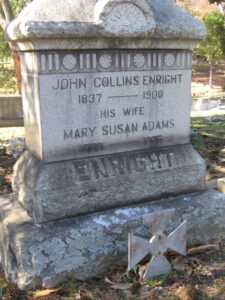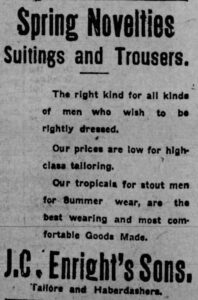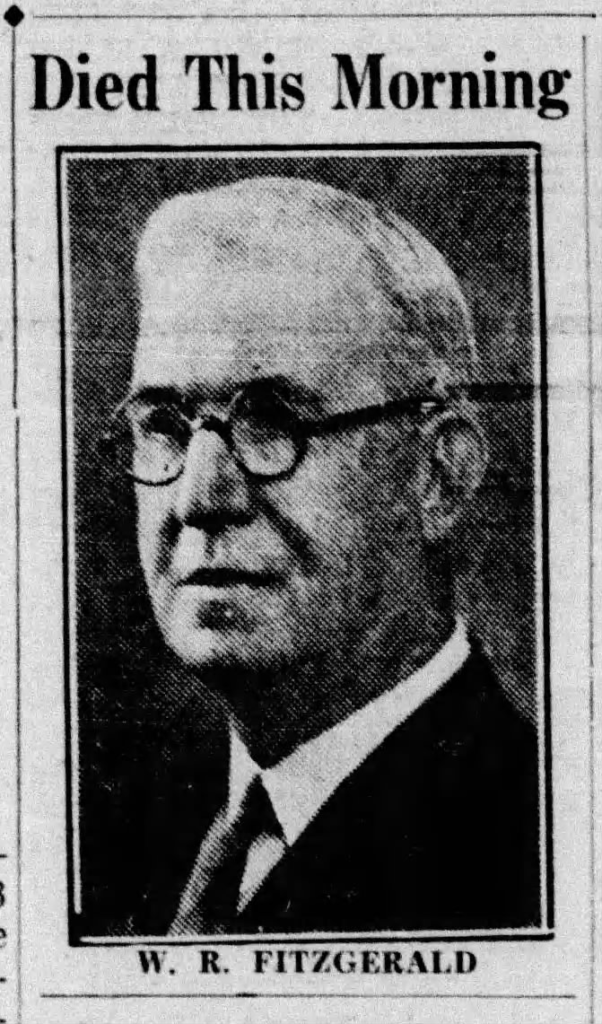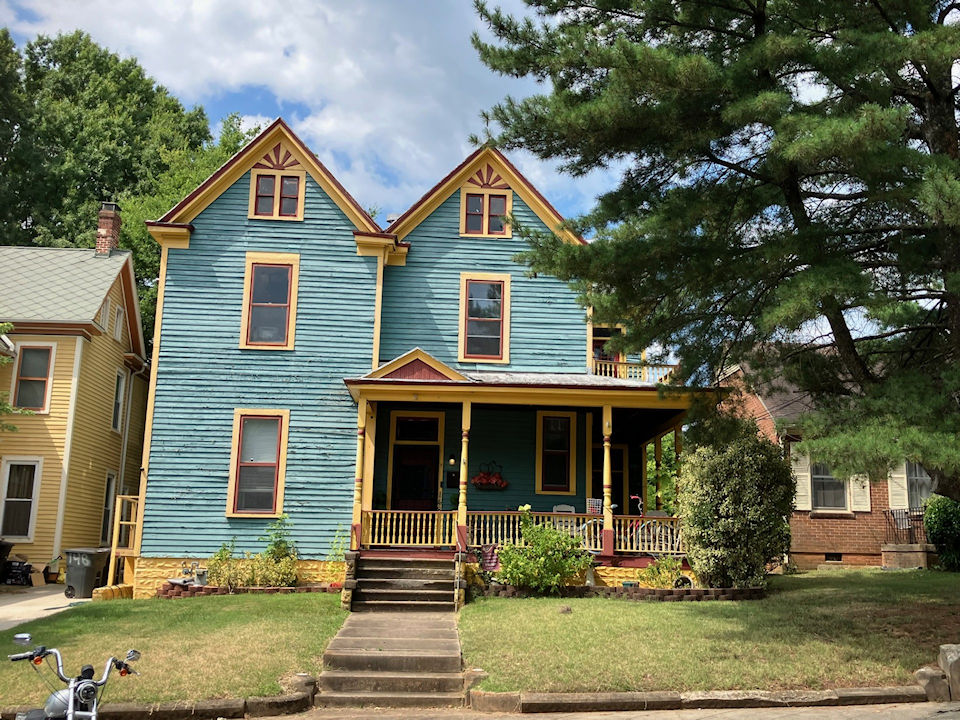 Upon Major Sutherlin’s disposal of the property at 148 Sutherlin Ave to pay a debt in 1894, it was acquired by F.X. Burton. Burton died in 1904, and Alice, his wife, sold it to Etta Enright for $1,150.
Upon Major Sutherlin’s disposal of the property at 148 Sutherlin Ave to pay a debt in 1894, it was acquired by F.X. Burton. Burton died in 1904, and Alice, his wife, sold it to Etta Enright for $1,150.
Etta Enright was the daughter of John C. Enright and Mary S. Adams Enright. John, a native of Limerick, Ireland, came to the United States as a small boy. Dates differ depending on sources, but his obituary of Oct 16, 1900 in Lynchburg’s News and Advance stated he had arrived in Danville as early as 1839 (he was born in 1837), though the U.S. Census of 1900 states he did not immigrate to the United States until 1852 (possibly a naturalization date). Whatever the case, he was willing to join the cause of the Confederacy when war broke out, and he served in the Company of the Eighteenth Virginia Infantry. In 1863 he married Mollie S. Adams of Petersburg, Virginia. The couple had nine children, five of whom survived him. The second youngest of those children was Etta, who was born in 1875. John died in October of 1900, and it was shortly thereafter that Etta purchased the Sutherlin Avenue property, installing her mother there as head of the household.

Mr. Enright had worked as a tailor and had one of the “oldest concerns in the city” under the name J.C. Enright’s Sons Tailors and Haberdashers. Upon his retirement, he left the business to this sons, John Dame Enright, the oldest living, William Meade, and Oscar Bunting, the youngest. The business folded in February of 1910, when the brothers filed a deed of assignment stating that they had become, “indebted to various parties, which debts cannot be promptly met in the regular course of its business”. The business was broken up and its assets sold.
Etta taught music from her home and was a skilled and gifted pianist, hosting annual recitals that were well attended by many of the city’s most prominent citizens. She was known to teach as many as 32 students at a time. Though she sold the house to her brother, William, in 1911, she remained in the home for some time. Like Etta, William Meade never married. He was born the 4th of August 1872 and was employed with his brothers in the tailor and haberdashery business established by their father. In 1924, Mrs. Enright moved to Washington, D.C. to be near one of her married daughters, and it was there she passed away in 1926. After William sold the home in 1927, Etta, too, relocated to Washington, D.C., to live with her sister, Mamie. William continued to call Danville home, but he spent his winters in Florida. He often visited his sisters in D.C. as well, and it was while visiting them in 1935 that he fell ill and never recovered. His body was returned to Danville where he was interred in the family plot in Green Hill Cemetery. Etta died in 1955 and was also returned to Danville to be buried in the family plot.
 William Enright sold the Sutherlin Avenue home to William Robert “Budge” Fitzgerald. Budge, as he was known, was born March 16, 1865 in Ingram, Halifax County, Virginia. Budge arrived in Danville in 1888 after an education at Virginia Polytechnic Institute and Richmond University which led him to pursue several and varied business interests here. He started out in the warehouse business, and for many years was secretary-treasurer of the Danville Warehouse Company and was closely associated with Capt. John G. Lea of Banner warehouse. He later became a city councilman and served as president of the Common Council from 1908 to 1912.
William Enright sold the Sutherlin Avenue home to William Robert “Budge” Fitzgerald. Budge, as he was known, was born March 16, 1865 in Ingram, Halifax County, Virginia. Budge arrived in Danville in 1888 after an education at Virginia Polytechnic Institute and Richmond University which led him to pursue several and varied business interests here. He started out in the warehouse business, and for many years was secretary-treasurer of the Danville Warehouse Company and was closely associated with Capt. John G. Lea of Banner warehouse. He later became a city councilman and served as president of the Common Council from 1908 to 1912.
As the United State’ involvement in the First World War began to escalate, he volunteered his services with the Young Men’s Christian Association and served overseas under the auspices of that organization. Upon returning to Danville, he was elected president of the Agricultural Credit Corporation, an agency sponsored by the Danville Chamber of Commerce to assist farmers to finance their crops and which served as a saving grace to many during the depression years that followed the Great War. From 1925 until 1942 he was acting president of American National Bank.
In the autumn of 1942, Budge suffered a stroke that would hospitalize him for the next four months. He recuperated enough by the beginning of the new year that he was able to begin resuming his duties, but a second stroke proved the end, and he passed away suddenly on January 11, 1943. Budge never married, but he was a beloved figure both in his community and in his family, so much so that he was honored to have a nephew who was named Budge after him.
Though Mr. Fitzgerald’s name was on the deed of the home, census records indicate that John F. Bass was the owner in 1930, with Budge living there as John’s half brother. After considerable genealogical digging, this claim doesn’t hold up. Even Mr. Fitzgerald’s obituary names John Fitzgerald Bass as Budge’s nephew. John’s mother Mildred Fitzgerald was Budge’s sister. It was likely John who was Budge’s heir, for when Budge died, the house was left to John Fitzgerald Bass and his wife, Cecil Baker Ould.
John Fitzgerald Bass was born August 17, 1885 in Chatham, Virginia. He was a tobacco grower and was engaged in the tobacco warehouse business. He married Cecil Ould in 1905, and the couple had four children. Cecil died in 1944, and John remarried. He passed away four years later. Upon his death, the house passed to American National Bank who auctioned the home in July of 1950.
The new owners were Louis S. and Helen . Booth. The Booths maintained the home as rental property, converting the house into four units. It remained in that status through two more transfers until 1999 when the present owners, Charles and Lori King purchased it.
Sources:
Census and Vital records found at Familysearch.org
Images and vital information, including biographical sketches found at FindaGrave.com
Death notices and other information found in the Danville Register, Danville Bee and other newspaper archives at Newspapers.com and GenealogyBank.com
Census, Directory, Newspaper, and other information compiled by Paul Liepe

I enjoyed reading this. Thank you. I am curious about the deed of assignment. Does that record reside in the circuit court clerk’s office? Thank you.
Dale